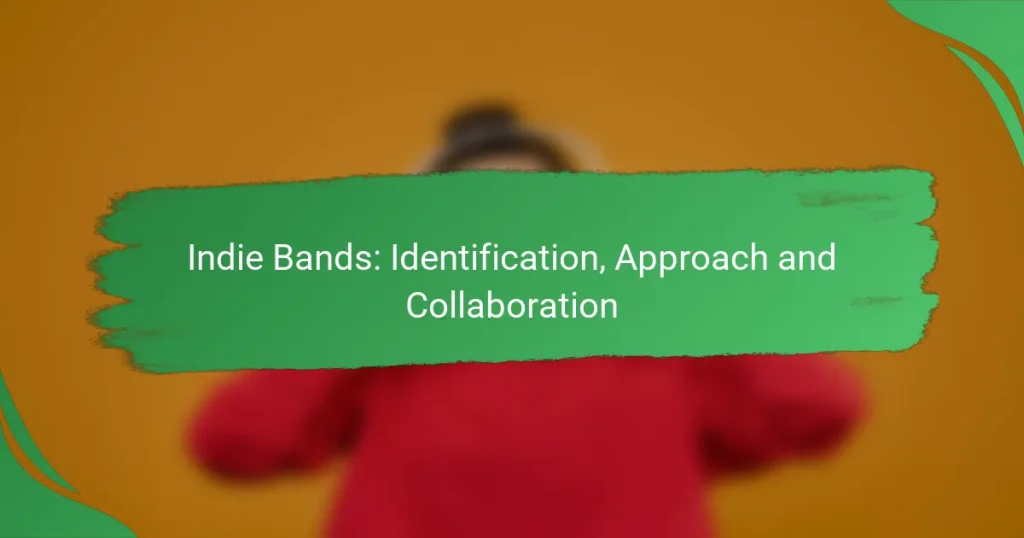Indie bands in the UK are characterized by their distinctive sound, DIY approach, and strong local ties, often operating independently of major record labels. To enhance collaboration with these artists, effective networking and the use of online tools can facilitate meaningful connections and joint performances, benefiting both the bands and their collaborators.
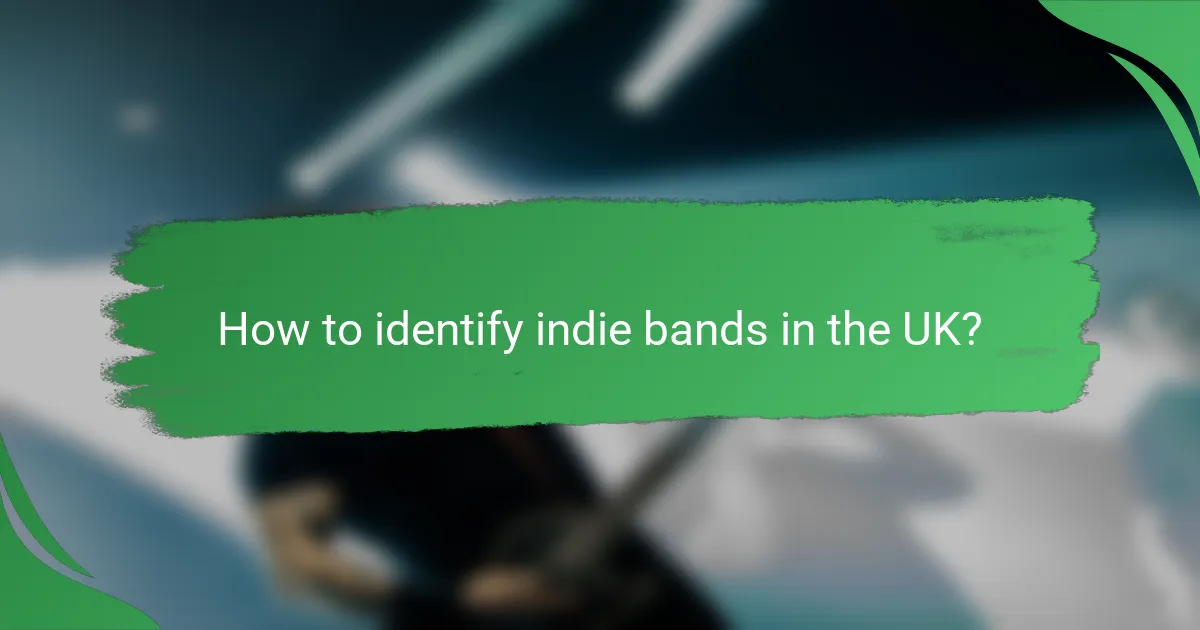
How to identify indie bands in the UK?
Identifying indie bands in the UK involves recognizing their unique sound, DIY ethos, and often local roots. These bands typically operate outside of major record labels, showcasing a distinct style that resonates with niche audiences.
Local music scenes
Local music scenes are vital for discovering indie bands. Cities like London, Manchester, and Bristol have vibrant underground scenes where emerging artists perform in small venues and pubs. Attending gigs in these areas can help you spot new talent and understand the local music culture.
Look for community events, open mic nights, and showcases that highlight local artists. Engaging with local music communities on platforms like Facebook or Meetup can also lead to discovering indie bands before they gain wider recognition.
Social media platforms
Social media platforms are essential tools for identifying indie bands. Many artists use Instagram, Twitter, and TikTok to share their music, connect with fans, and promote upcoming shows. Following hashtags like #IndieMusic or #NewMusic can help you discover fresh sounds.
Engage with these platforms by liking, sharing, and commenting on posts to support indie artists. Additionally, platforms like Bandcamp allow you to explore and purchase music directly from independent musicians, often leading to hidden gems.
Music festivals
Music festivals are excellent venues for discovering indie bands. Events such as Glastonbury, Latitude, and Reading & Leeds often feature a diverse lineup, including many up-and-coming indie acts. Attending these festivals provides a chance to experience live performances and connect with other music enthusiasts.
Consider checking festival lineups in advance and creating a schedule to prioritize indie bands you want to see. Smaller festivals, like Green Man or End of the Road, often focus more on indie music, providing an intimate setting to explore new artists.

What approaches can enhance collaboration with indie bands?
Enhancing collaboration with indie bands can be achieved through effective networking, utilizing online tools, and organizing joint performances. These strategies foster connections, streamline communication, and create shared experiences that benefit all parties involved.
Networking events
Networking events are essential for building relationships within the indie music scene. Attending local music festivals, open mic nights, or industry meetups allows artists to connect with each other and potential collaborators. Engaging in conversations and sharing experiences can lead to fruitful partnerships.
When participating in these events, be prepared with business cards or digital portfolios to showcase your work. Follow up with new contacts after the event to maintain the connection and explore collaboration opportunities.
Online collaboration tools
Online collaboration tools streamline communication and project management for indie bands. Platforms like Slack, Trello, or Google Drive allow musicians to share ideas, files, and schedules efficiently. These tools are especially useful for bands with members in different locations.
Consider using cloud storage for easy access to music files and documents. Regular virtual meetings can help keep everyone aligned on goals and progress, ensuring that all members contribute effectively to the collaborative process.
Joint performances
Joint performances can significantly enhance collaboration by bringing together different indie bands for shared shows. This not only expands the audience reach for each band but also fosters a sense of community. Collaborating on setlists or promotional efforts can create a more cohesive experience for attendees.
When planning joint performances, consider venues that support multiple acts and have a good reputation in the local scene. Promote the event collectively through social media and local press to maximize visibility and attendance.
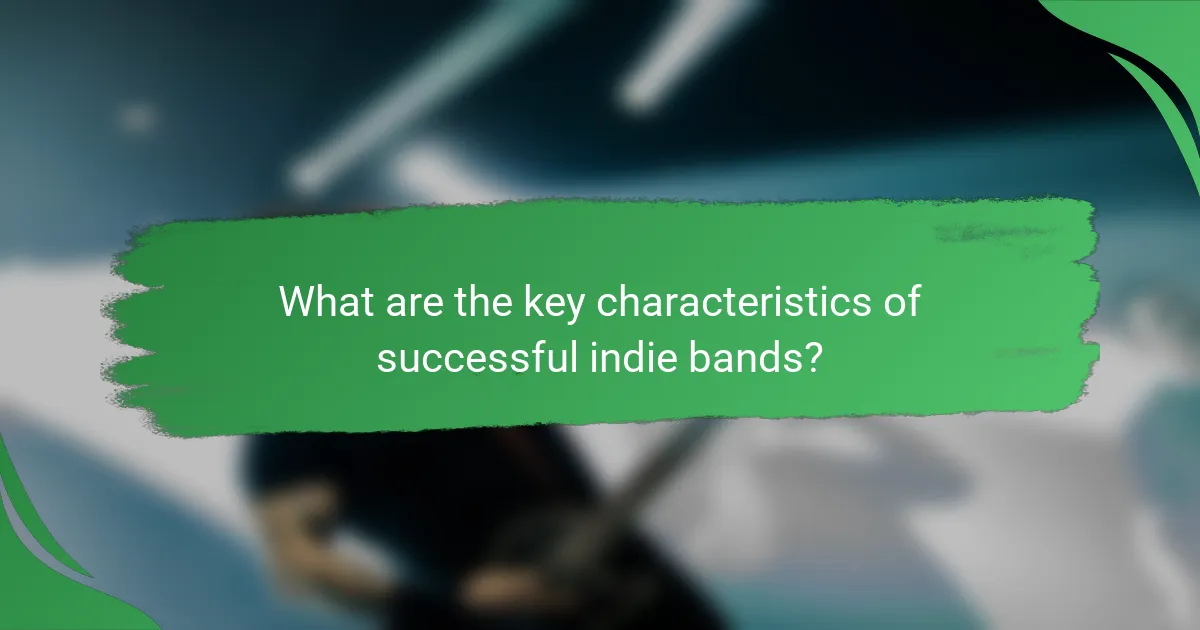
What are the key characteristics of successful indie bands?
Successful indie bands typically possess a unique sound, a strong online presence, and an engaged fanbase. These characteristics help them stand out in a competitive music landscape and foster lasting connections with listeners.
Unique sound
A unique sound is essential for indie bands to differentiate themselves from mainstream music. This often involves blending various genres, experimenting with unconventional instruments, or incorporating personal influences that resonate with their artistic vision.
For example, some bands may mix folk elements with electronic beats, creating a fresh auditory experience. It’s crucial for indie artists to maintain authenticity while exploring new musical territories to keep their sound distinctive.
Strong online presence
A strong online presence is vital for indie bands to reach wider audiences and promote their music effectively. This includes maintaining active profiles on social media platforms, engaging with fans through regular updates, and utilizing streaming services to distribute their music.
Indie bands should focus on creating visually appealing content, such as music videos and behind-the-scenes footage, to enhance their online visibility. Consistent interaction with fans can foster loyalty and encourage word-of-mouth promotion.
Engaged fanbase
Having an engaged fanbase is crucial for the sustainability of indie bands. This involves not only attracting listeners but also building a community around the music. Engaged fans are more likely to attend shows, purchase merchandise, and share the band’s work with others.
To cultivate an engaged fanbase, indie bands can host live Q&A sessions, offer exclusive content, or create fan clubs. It’s important to listen to fan feedback and adapt to their interests, ensuring a strong connection that can lead to long-term support.
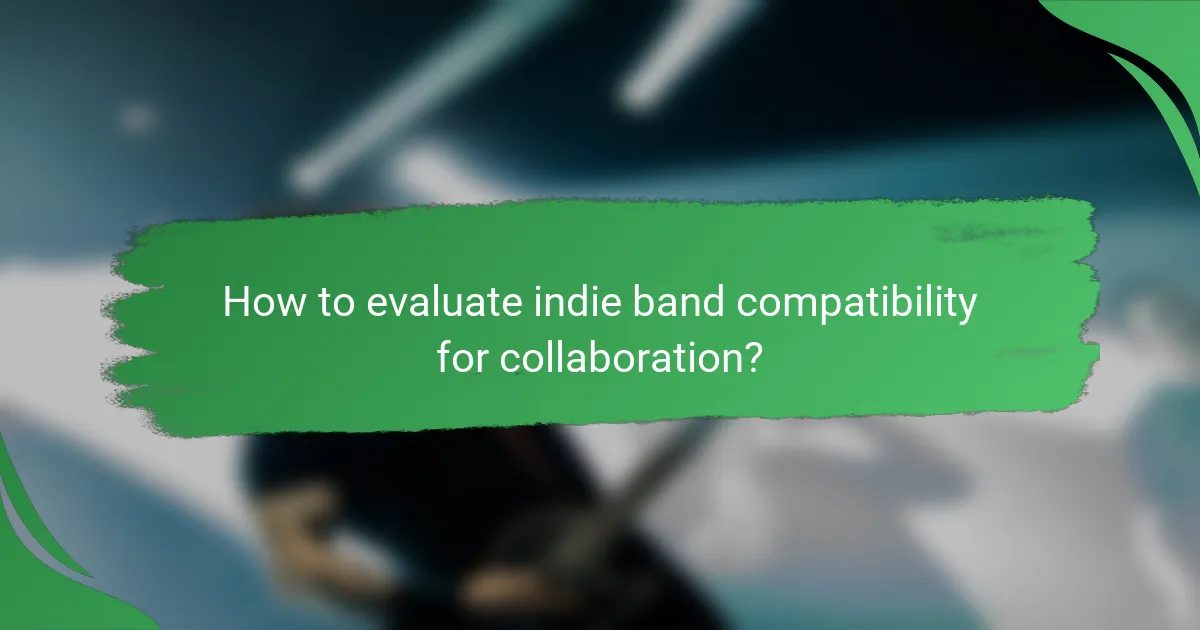
How to evaluate indie band compatibility for collaboration?
Evaluating indie band compatibility for collaboration involves assessing musical styles, shared values, and past successes. These factors can significantly influence the effectiveness and harmony of the partnership.
Musical style alignment
Musical style alignment is crucial for a successful collaboration. Bands should have complementary genres or influences to create a cohesive sound. For example, a folk band collaborating with an indie rock group may find common ground in acoustic elements.
Consider the tempo, instrumentation, and lyrical themes when assessing alignment. A good practice is to share a few demo tracks to gauge how well the styles mesh. Aim for bands that have similar audiences to maximize engagement and appeal.
Shared values and vision
Shared values and vision can enhance collaboration by ensuring both bands are on the same page regarding artistic goals and ethics. Discussing themes, messages, and the intended impact of the music can reveal compatibility.
For instance, if both bands prioritize social issues in their lyrics, they may resonate more deeply with their audiences. Establishing a common mission can foster a stronger partnership and lead to more meaningful creative outcomes.
Previous collaboration success
Evaluating previous collaboration success provides insight into a band’s ability to work well with others. Look for bands that have a track record of fruitful partnerships, as this often indicates good communication and adaptability.
Check their social media or press releases for past projects and reviews. Positive feedback from previous collaborations can be a strong indicator of potential success. Avoid bands with a history of conflicts or unresolved issues, as this may signal future challenges.
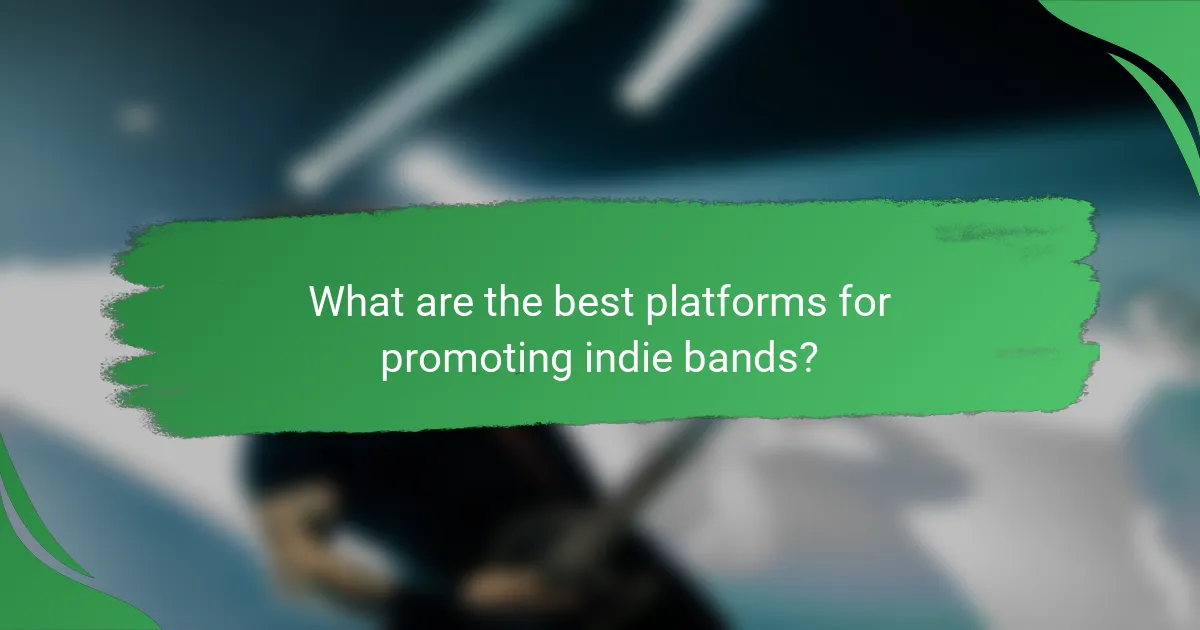
What are the best platforms for promoting indie bands?
Indie bands can effectively promote their music and reach wider audiences through various platforms tailored for independent artists. The best platforms include Bandcamp, SoundCloud, and Spotify, each offering unique features and opportunities for engagement.
Bandcamp
Bandcamp is a popular platform that allows indie bands to sell their music directly to fans while retaining a significant portion of the revenue. Artists can set their own prices, offer digital downloads, and even sell physical merchandise, creating a personal connection with their audience.
To maximize success on Bandcamp, bands should regularly update their profiles, engage with fans through comments, and utilize the platform’s promotional tools, such as discount codes and pre-order options. It’s also beneficial to share exclusive content to encourage fans to support their work.
SoundCloud
SoundCloud serves as a social network for musicians, enabling indie bands to upload tracks, share them, and connect with listeners. The platform’s user-friendly interface allows for easy sharing across social media, helping to increase visibility and engagement.
To stand out on SoundCloud, bands should focus on creating high-quality audio, engaging with listeners through comments, and collaborating with other artists. Utilizing tags effectively can also help in reaching the right audience, as well as participating in relevant groups and discussions.
Spotify
Spotify is one of the largest streaming platforms, making it essential for indie bands looking to gain exposure. By distributing music through a digital aggregator, artists can get their tracks on Spotify playlists, which can significantly boost their reach and listener base.
To optimize presence on Spotify, bands should create engaging artist profiles, regularly release new music, and promote their tracks on social media. Collaborating with playlist curators and leveraging Spotify’s promotional tools, like Spotify for Artists, can further enhance visibility and listener engagement.
